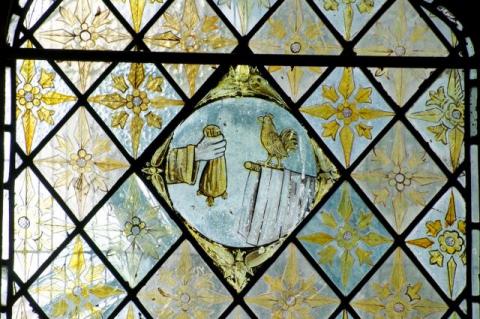The following errors have occurred:
- Please login or signup for a membership to continue enjoying the free trial of AwesomeStories. This is a necessary step to help us communicate new features and stories to our members. Thank you!
-
Table of Contents
- 0. STORY PREFACE
- 1. THE DEATH OF LAZARUS
- 2. TRIUMPH IN JERUSALEM
- 3. JESUS PREDICTS HIS DEATH
- 4. THE LAST SUPPER
- 5. THE GARDEN OF GETHSEMANE
- 6. THE ARREST
- 7. THE FIRST TRIAL
- 8. THE SECOND TRIAL: BEFORE PILATE
- 9. JESUS BEFORE HEROD
- 10. THE DEATH SENTENCE
- 11. THE CROSS
- 12. THE PLACE OF THE SKULL
- 13. THE TOMB
- 14. AN EMPTY TOMB
- 15. JESUS APPEARS TO OTHERS
- 16. EASTER STORY in ART
Detail—depicting Judas' money bag and a cockerel—from an early 16th-century stained-glass window in Wales. Copyright, Martin Crampin, all rights reserved. Image provided here as fair use for educational purposes. Online via University of Wales Centre for Advanced Welsh and Celtic Studies—"Stained Glass in Wales" website.
Since Herod had authority in Galilee, and since Jesus was a Galilean, Pilate must have thought he could get rid of the problem by giving Herod Antipas jurisdiction.
Herod, who had wanted to meet Jesus for some time, was willing to take on the assignment.
Asking question after question, Herod hoped he would see Jesus perform miracles. Jesus, however, responded with silence.
Frustrated, Herod and his soldiers mocked Jesus, gave him an elegant robe - fit for a king - and sent Him back to Pilate ... uncondemned.
Judas, meanwhile, was sorry for betraying his friend:
He was seized with remorse and returned the thirty silver coins to the chief priests and the elders. "I have sinned," he said, "for I have betrayed innocent blood."
It was too late, however, for Judas to take back his actions:
"What is that to us?" they replied. "That's your responsibility." So Judas threw the money into the temple and left. Then he went away and hanged himself.
What happened to the money he returned?
The chief priests picked up the coins and said, "It is against the law to put this into the treasury, since it is blood money." So they decided to use the money to buy the potter's field as a burial place for foreigners. That is why it has been called the Field of Blood to this day.
In modern times, the "Field of Blood" is known as Akeldama.
-
Table of Contents
- 0. STORY PREFACE
- 1. THE DEATH OF LAZARUS
- 2. TRIUMPH IN JERUSALEM
- 3. JESUS PREDICTS HIS DEATH
- 4. THE LAST SUPPER
- 5. THE GARDEN OF GETHSEMANE
- 6. THE ARREST
- 7. THE FIRST TRIAL
- 8. THE SECOND TRIAL: BEFORE PILATE
- 9. JESUS BEFORE HEROD
- 10. THE DEATH SENTENCE
- 11. THE CROSS
- 12. THE PLACE OF THE SKULL
- 13. THE TOMB
- 14. AN EMPTY TOMB
- 15. JESUS APPEARS TO OTHERS
- 16. EASTER STORY in ART


 Back
Back
 Next Chapter
Next Chapter

 Back
Back
 Next Chapter
Next Chapter

